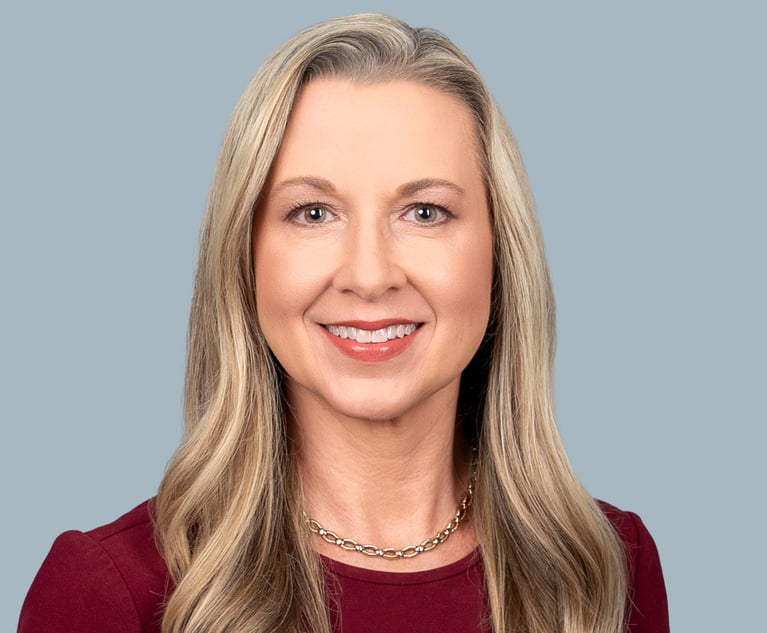 Photo: Toonzzz/Shutterstock.com
Photo: Toonzzz/Shutterstock.comCaught Ink-Handed? FINRA Bars Former General Counsel Accused of Cheating on Exam
Accused of writing notes on his hands and driver's license, Thomas Lykos allegedly "began licking and rubbing his hands and fingers" until the exam proctor "reminded him that he was being recorded," the FINRA decision states.
May 06, 2020 at 01:22 PM
6 minute read
The ink pen malfunction defense fell flat for Thomas Lykos Jr., a former Securities and Exchange Commission enforcement attorney and general counsel and chief compliance officer for a Texas financial services firm who was allegedly busted cheating on a competency exam.
While retaking the general security principal qualification exam after failing his first try, Lykos scribbled notes on his fingers, forearms, driver's license and possibly a business card that he obtained during an unscheduled break, according to a decision from a Financial Industry Regulatory Authority Office hearing panel.
Lykos passed the exam and was heading for the exit when the proctor stopped him and asked to photograph his hands—she'd noticed the alleged crib notes while walking around the testing room.
First, Lykos denied that he had ink on his hands. Then he said his pen must have leaked.
But the proctor wasn't buying it.
"When he failed to persuade the proctor not to photograph his hands, Lykos began licking and rubbing his hands and fingers, and stopped only when she [the proctor] reminded him that he was being recorded," the FINRA decision states.
Lykos, who needed to pass the exam to keep his chief compliance officer job for Houston-based Sanders Morris Harris, later argued during his FINRA hearing that his unusual behavior—the bulk of which was captured on a video surveillance camera mounted above his exam workstation—was the product of his pens being dry and not having a fine tip.
"As a result, he testified, it was easier for him to write on his driver's license and hands after he had moistened them with perspiration by licking them," according to the hearing panel's decision.
Lykos, a graduate of Harvard College and the University of Texas School of Law, also asserted that he was writing letters on his body and driver's license to eliminate wrong answers to multiple-choice questions on the exam.
The hearing panel shot down Lykos' defense, noting that he was given two pens but didn't try to use the second pen before writing on his driver's license. He also didn't tell the proctor that he was having pen trouble.
Photos of Lykos' hands after the exam showed that the "smeared writing on his fingers was clearly more than just A, B, or C," according to the decision. The panel also found that Lykos "demonstrated consciousness of guilt" during the exam by trying to conceal his notes when people approached his work station.
The panel added, "He wrote on the sides of the fingers of his left hand, and then kept his left hand inside his pocket during the check-out process."
Concluding that "he cheated," the panel barred Lykos from associating with any FINRA member firm and ordered him to pay $5,110 in costs.
Lykos' attorney, Larry Rothenberg of Houston, said in an interview Wednesday that the FINRA decision is "unjust" and based on a "bunch of conjecture and speculation about circumstantial evidence." He said Lykos plans to appeal the decision to the National Adjudicatory Council, SEC and, if necessary, federal court.
"That's where you're going to get a fair hearing and a real judge," Rothenberg said. "In order to believe the results in this case you have to believe that someone changed a 40-year history of their character and went from a pillar of integrity to a cheater. There's just no evidence of that in this case."
Rothenberg acknowledged that Lykos "did act strangely" during the exam: "Yes, his methods and what he did during the test was a little bit odd. But everything he did was out of his brain," he said, referring to the notes in question.
Sanders Morris Harris chairman George Ball declined an interview request Wednesday. Lykos no longer works for the firm and has been unable to find full-time employment, according to Rothenberg.
"He's picking up odd jobs, but he can't get a job because of this," he said.
The FINRA panel also found "compelling circumstantial evidence that Lykos received assistance on the exam," based on his actions after leaving the exam room for an unscheduled break. Lykos testified that he walked out because he was experiencing side effects from pain medication he'd taken for a recent dental surgery.
Lykos testified at his hearing that during his break he visited a bank teller he knows who worked in the same building where the exam was being given. After resting in her office for 15 minutes and taking another painkiller, Lykos said he headed back to the test center, picking up a business card from a leasing agent for the building along the way.
During his hearing, Lykos denied writing on the card. But during his earlier on-the-record interview with FINRA, he testified that he "may have made notes on a business card" that were related to subjects on the exam, according to the decision.
Asked at the hearing to explain his inconsistent testimony, Lykos testified, "The more I think about it, the more I think I did not sit down and make notes at that point in time." But the FINRA panel noted that Lykos never attempted to correct his earlier testimony before the hearing.
When Lykos returned to the exam room, the proctor noticed a business card protruding from his front jacket pocket and told him to throw it away, which he did. The card was never retrieved, and it remains unclear what, if anything, was written on it.
Lykos spent the next 14 minutes reviewing his exam answers and changed his responses to two questions: He corrected one wrong answer and changed one incorrect answer for another incorrect answer.
This content has been archived. It is available through our partners, LexisNexis® and Bloomberg Law.
To view this content, please continue to their sites.
Not a Lexis Subscriber?
Subscribe Now
Not a Bloomberg Law Subscriber?
Subscribe Now
NOT FOR REPRINT
© 2025 ALM Global, LLC, All Rights Reserved. Request academic re-use from www.copyright.com. All other uses, submit a request to [email protected]. For more information visit Asset & Logo Licensing.
You Might Like
View All

NLRB Blisters Skilled Care Home Chain That Terminated Nursing Assistant Who Complained About Wages
6 minute read
Ex-Six Flags CLO Lands New C-Suite Post—This Time as HR Chief
Trending Stories
- 1Financially Grounded: South Florida-Based Silver Airways Files for Bankruptcy
- 2Cozen O'Connor Accused of Overbilling, Duplicate Work
- 3Texas Judge Resigns Amid Ethics Case
- 4Skadden Corporate Partner Departs For Cooley in Beijing
- 5Sidley Cross-Border Transactions Partner Heads to Winston & Strawn
Who Got The Work
Michael G. Bongiorno, Andrew Scott Dulberg and Elizabeth E. Driscoll from Wilmer Cutler Pickering Hale and Dorr have stepped in to represent Symbotic Inc., an A.I.-enabled technology platform that focuses on increasing supply chain efficiency, and other defendants in a pending shareholder derivative lawsuit. The case, filed Oct. 2 in Massachusetts District Court by the Brown Law Firm on behalf of Stephen Austen, accuses certain officers and directors of misleading investors in regard to Symbotic's potential for margin growth by failing to disclose that the company was not equipped to timely deploy its systems or manage expenses through project delays. The case, assigned to U.S. District Judge Nathaniel M. Gorton, is 1:24-cv-12522, Austen v. Cohen et al.
Who Got The Work
Edmund Polubinski and Marie Killmond of Davis Polk & Wardwell have entered appearances for data platform software development company MongoDB and other defendants in a pending shareholder derivative lawsuit. The action, filed Oct. 7 in New York Southern District Court by the Brown Law Firm, accuses the company's directors and/or officers of falsely expressing confidence in the company’s restructuring of its sales incentive plan and downplaying the severity of decreases in its upfront commitments. The case is 1:24-cv-07594, Roy v. Ittycheria et al.
Who Got The Work
Amy O. Bruchs and Kurt F. Ellison of Michael Best & Friedrich have entered appearances for Epic Systems Corp. in a pending employment discrimination lawsuit. The suit was filed Sept. 7 in Wisconsin Western District Court by Levine Eisberner LLC and Siri & Glimstad on behalf of a project manager who claims that he was wrongfully terminated after applying for a religious exemption to the defendant's COVID-19 vaccine mandate. The case, assigned to U.S. Magistrate Judge Anita Marie Boor, is 3:24-cv-00630, Secker, Nathan v. Epic Systems Corporation.
Who Got The Work
David X. Sullivan, Thomas J. Finn and Gregory A. Hall from McCarter & English have entered appearances for Sunrun Installation Services in a pending civil rights lawsuit. The complaint was filed Sept. 4 in Connecticut District Court by attorney Robert M. Berke on behalf of former employee George Edward Steins, who was arrested and charged with employing an unregistered home improvement salesperson. The complaint alleges that had Sunrun informed the Connecticut Department of Consumer Protection that the plaintiff's employment had ended in 2017 and that he no longer held Sunrun's home improvement contractor license, he would not have been hit with charges, which were dismissed in May 2024. The case, assigned to U.S. District Judge Jeffrey A. Meyer, is 3:24-cv-01423, Steins v. Sunrun, Inc. et al.
Who Got The Work
Greenberg Traurig shareholder Joshua L. Raskin has entered an appearance for boohoo.com UK Ltd. in a pending patent infringement lawsuit. The suit, filed Sept. 3 in Texas Eastern District Court by Rozier Hardt McDonough on behalf of Alto Dynamics, asserts five patents related to an online shopping platform. The case, assigned to U.S. District Judge Rodney Gilstrap, is 2:24-cv-00719, Alto Dynamics, LLC v. boohoo.com UK Limited.
Featured Firms
Law Offices of Gary Martin Hays & Associates, P.C.
(470) 294-1674
Law Offices of Mark E. Salomone
(857) 444-6468
Smith & Hassler
(713) 739-1250







